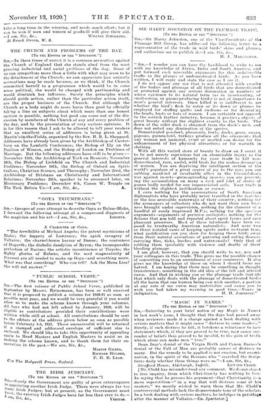SIR BARRY JOHNSTON ON THE PLUMAGE TRADE. [To THE EDITOR
Or THE "SPECTATOR.") SIR—Sir Harry Johnston, one of the Vice-Presidents of the Plumage Bill Group, has addressed the following letter to a representative of the trade in wild birds' skins and plumes, and authorizes use to publish it—I azu, Sir, &e., H. J. MASSI,IGILIM.
" Szn,—I wonder you can have the hardihood to write to me with my knowledge of Africa, India and South A meriea, and put forward such miserable arguments for this indefensible traffic in the plumes of undomesticated birds. As you have written, I will reply and state the case as I see it.
I do net oppose any use that is not ultentlet with cruelty of the bodies and plumage of all birds that are domesticated or protected against any serious diminution in numbers or whose existence to its natural term (as in insect-eating, or snail-eating, or guano-producing birds) is not of importance to man's general interests. Once killed it is indifferent to me whether the bird's flesh be eaten or its down or plumes be employed for stuffing quilts and cushion; or for decorating the heads, bust; or hats of women. I am certainly not opposed to the ostrich feather industry, because it produecs objects of great beauty without the slightest cruelty to the birds. The down of the eider duck is obtaints1 from the duck's nest, and does not entail any diminution of the species. Domesticated pea-fowl, pheasants, fowls, ducks, geese, swans, pigeons, guinea-fowl, turkeys produce all the ornaments that any woman not immoral, cruel or morbid can desire for the enhancement of her physical attractions or for warmth in clothing.
With all this varied store of beauty to draw on I count it to be not merely capricious but an abominable injury to the general interest; of humanity for your trade to kill sort. domesticated, rare, useful, wild birds for the useless decoration of women. You are depriving the intelligent section of the world's populace of a great source of joy to the eye; you are robbing mankind of invaluable allies in the life-and-death war against insects—germ-spreading insects; you are prevent- ing the accumulation on many a rook and islet of stores of guano badly needed for our impoverished soils. Your trade is without the slightest justification or excuse.
I care nothing for the asseverations of South American diplomatists who have probably never travellml in the nia,lies or the less accessible waterways of their country; nothing for the assurances of collectors who do not want their own busi- ness brought under supervision, nothing for the clamour of a handful of easily impressed M.P.s; nothing for the speeioas arguments—arguments of perverse zoologists; nothing fee the fictions that are told and repeated about egret farms and rave pheasant preserves. Most of these falsehoods have been ex- posed by trustworthy American naturalists. And were two or three isolated cases of keeping egrets under restraint true, what justification can you show for keeping these birds away from their natural avocations of pursuing and eating disease- carrying flies, ticks, leeches and water-snails? Only that of robbing them (probably with violence and death) of their bleeding plumage.
I am glad, however, that you should write to me, you and 'your colleagues in this trade. This gives one the possible chance of converting you to an amendment of your commerce. It also gives me the knowledge of those on whom I should focus my hatred. I am hoping that there may be something in thought transference; something in the old idea of the felt anti uttered curse. And that in wishing you or the plumage trade (outside that which only deals with the plumage of domesticated birds) all the harm that one human being can wish another, a portion at any rate of my curse may tnaterialize and cause you to wish you had taken my warning in good time—Yours in indignation, IT. II. JOHNSTON."






































 Previous page
Previous page